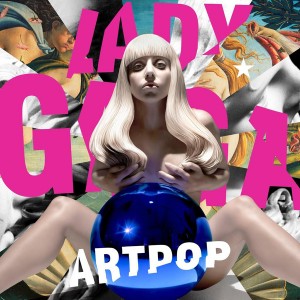Lady Gaga’s new album retreads old ideas
Controversy sells. It’s an unfortunate fact of life, one that is embodied by Stefani Joanne Angelina Germanotta, better known by her stage name, Lady Gaga. The New York native has taken the old adage and fashioned a career out of it, and it seems there’s scarcely a person in the United States who can hear the name “Lady Gaga” without having some intense reaction of either love or hate.

Pop, not art · Lady Gaga’s new album, while catchy, feels lyrically redundant and fails to break any new ground on the artist’s persona. – Photo courtesy of Interscope Records
And yet there’s a reason why Lady Gaga must, with each album release and each outlandish bubble dress, be considered relevant: Her music is catchy. She can sing her (constantly near-bared) a– off, and there’s no amount of mean Perez Hilton tweets that could detract from that. It’s inescapable, like Kanye West melting down at the MTV Video Music Awards and then subsequently releasing the masterful My Beautiful Dark Twisted Fantasy.
Unlike West, who challenged his listeners with his latest release, Yeezus, Lady Gaga is tending toward safer material on her latest album Artpop, which was released this week.
The album’s leading single, “Applause,” is an upbeat synth-pop track that captures a majority of the good things about Lady Gaga: catchy, staccato synth loops over ’80s pop-rock drums as Lady Gaga sings about how much she enjoys applause. But it’s better if listeners don’t pay any closer attention than that, because the lyrics occasionally drift into cringe-worthy territory. Some of her songwriting gems include: “I’ve overheard your theory / Nostalgia’s for geeks / I guess sir, if you say so / Some of us just like to read,” which might give Jay Z’s “I don’t pop molly, I rock Tom Ford” a run for its money for the Most Awkward Unrelated Reference award.
But nuanced songwriting was never really Lady Gaga’s strong suit — what Gaga sells is the persona of someone who’s “different,” which means there’s a rap track featuring T.I., Twista and Too $hort. On “Jewels & Drugs,” Gaga sings about how controversial she is on a whiplash-inducing synth and horn fest produced by DJ White Shadow. Though the track is inventively arranged (each rapper has a different backbeat to complement his delivery), Gaga’s tired lyrical themes of being different and controversial again sound worse for the wear — not to mention they come off as amateurish next to the likes of T.I., who sounds like he’s capable of rapping 16 bars of self-flattery in his sleep.
The album’s highlight is “Dope,” an impassioned song of redemption about Gaga’s struggle with marijuana addiction following her hip surgery. The Rick Rubin-produced ballad strips down instrumentation in favor of Gaga’s vulnerable vocals. Though the key restricts Gaga to an emotionally wooden low register, she works within her constraints to showcase a spellbinding vocal performance that crests near the end of the track into full-fledged screams. In every facet (besides, again, the songwriting), “Dope” is a sweeping, emotional track that could have been bigger with grander aspirations — if, that is, Gaga was willing to share something about her personal life beyond what the general public already seems to know.
This feeling of “looking for more” pervades Artpop. The LP’s cover art, which features Lady Gaga posing naked with her legs wrapped around the album title, is telling in two ways. On the one hand, it suggests that Gaga is undressing for her fans, that the album is personal and full of insight into who she is. And yet, who she is appears to be a staggeringly vapid, commercialized pop icon for adolescents and adoring fans who seek her affirmation for being “different.”
This would all be perfectly fine if the album was capable of pushing forward new ideas or forging ahead in different realms with pop music, which isn’t completely out of the question. But the songs that appear on Artpop sound like Gaga is pushing “different for different’s sake” more than ever. Gone is the iconoclast who spoke for a generation of “Little Monsters”; this is a Gaga who sounds corporately manufactured and stale. In following with this latter persona, Gaga entreated her “Little Monsters” via Twitter to purchase multiple copies of her single to help it top the iTunes charts.
So does controversy still sell? Of course. But in the case of Artpop, it’s becoming clear that Lady Gaga is no longer controversial.
Follow Euno on Twitter @eunowhat


her album seems greater than other out there, and if you writing about it means she still controversial. I love the whole album of it with the exception of Jewels and Drugs. Then all of it it’s good!
You completely missed the mark on this.